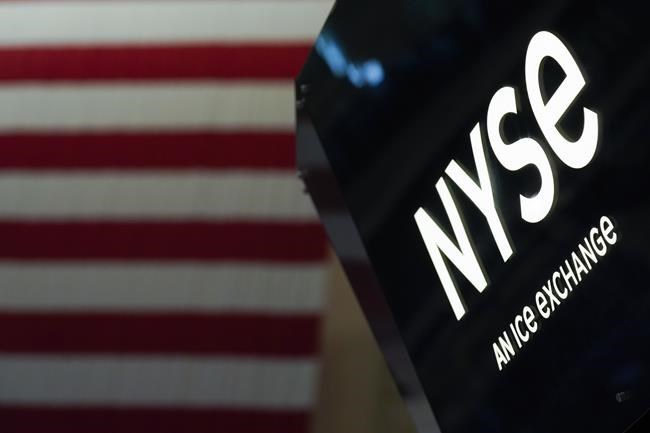NEW YORK (AP) — Wall Street slipped on worries a too-warm economy will push the Federal Reserve to keep interest rates higher for longer. The S&P 500 fell 0.3% Thursday, its third straight loss. Big Tech stocks were particularly weak, and the Nasdaq composite lost 0.9%. The Dow held up better, rising 57 points, because it has less of an emphasis on tech. Traders are forecasting nearly a coin flip’s chance that the Fed will raise rates again this year following reports showing the economy and job market are still humming. High rates hurt all kinds of stocks, particularly tech and other high-growth ones.
THIS IS A BREAKING NEWS UPDATE. AP’s earlier story follows below.
NEW YORK (AP) — Wall Street is slipping Thursday on worries that a too-warm economy will push the Federal Reserve to keep interest rates higher for longer.
The S&P 500 was 0.3% lower in afternoon trading and on track for a third straight loss. Big Tech stocks were particularly weak, and the Nasdaq composite was 0.9% lower. The Dow Jones Industrial Average was holding up better than the rest of the market because it has less of an emphasis on tech, and it was up 81 points, or 0.2%, at 34,518, as of 1:57 p.m. Eastern time.
Stocks were feeling pressure from the bond market, where yields rose earlier in the week after a report showed stronger growth for U.S. services industries last month than economists expected. Yields remained high after a report on Thursday said fewer U.S. workers applied for unemployment benefits last week than expected.
While such reports are encouraging for the economy, indicating a long-predicted recession is not near, they could also keep conditions humming strongly enough to push upward on inflation.
The Federal Reserve has already hiked its main interest rate to the highest level in more than two decades in hopes of slowing the economy enough to drive inflation back down to its 2% target. It’s come close, and inflation has cooled from its peak above 9% last summer. But the worry is that the last percentage point of improvement may be the toughest for the Fed.
“Yes, the economy has slowed and inflation has cooled, but employment continues to be a thorn in the side of the Fed, which has made softening the jobs market the cornerstone of its inflation battle,” said Mike Loewengart, head of model portfolio construction at Morgan Stanley Global Investment Office.
High interest rates drag down on prices for every kind of stock. But they tend to most hurt stocks of technology companies and others bid up on expectations for high growth far in the future. Many of those stocks also tend to be the most influential on the S&P 500 because they’re the biggest.
Apple is the dominant force on Wall Street because it’s the most valuable stock, and it fell 3.2% to follow up on its 3.6% drop a day before.
Nvidia sank 2.6% to bring its loss for the week so far to 5.5%. It and a cohort of other stocks in the artificial-intelligence industry have soared this year on expectations that AI could mean explosive future growth in profits.
C3.ai tumbled 12.6% after it said late Wednesday that it no longer expects to be profitable in its final fiscal quarter of the year, as it invests more in opportunities around generative AI. Analysts also pointed to disappointing profit margin levels for the company during its latest quarter, which was the first of its fiscal year.
While most stocks on Wall Street were falling, a handful were helping to limit the losses.
WestRock, a maker of containerboard and other packaging, rose 4% after Smurfit Kappa Group said it was in discussions to combine the two companies and keep its headquarters in Dublin, Ireland.
In the bond market, the yield on the two-year Treasury slipped to 4.98% from 5.03% late Wednesday. It's still well above the 4.88% level where it started the week. The two-year Treasury yield tends to track expectations for the Fed.
Traders still mostly expect the Fed to stand pat on interest rates at its next meeting later this month. But they’re betting on a nearly coin flip’s chance of another increase by the end of the year, according to data from CME Group.
The yield on the 10-year Treasury, which is the centerpiece of the bond market and helps set rates for mortgages and other important loans, fell to 4.27% from 4.30% late Wednesday.
In stock markets abroad, indexes fell in China following the latest set of discouraging data on the world’s second-largest economy. Hong Kong’s Hang Seng dropped 1.3%, and stocks in Shanghai fell 1.1% after a report said China’s exports fell from year-ago levels for the fourth straight month.
Its economic recovery has fallen well short of expectations after it removed anti-COVID restrictions. That has removed a big engine of growth for the global economy, but it’s also helped to take some pressure off inflation worldwide.
Stock indexes were moving only modestly in Europe and were mixed.
___
AP Business Writers Matt Ott and Elaine Kurtenbach contributed.
Stan Choe, The Associated Press



